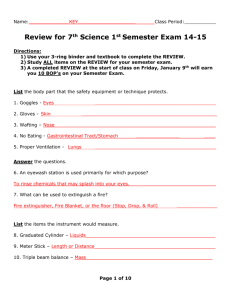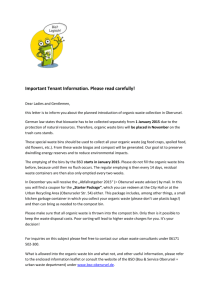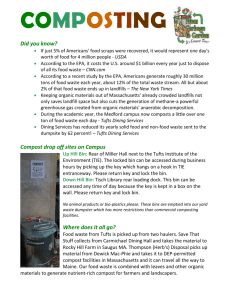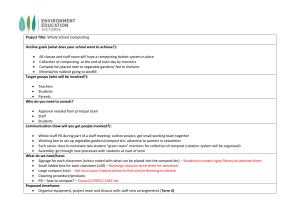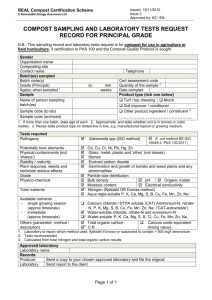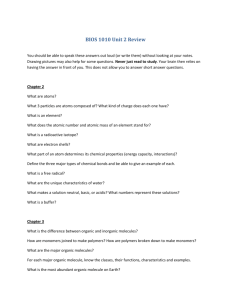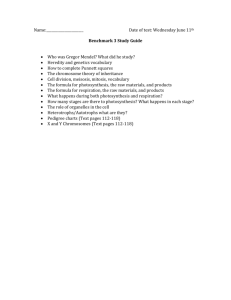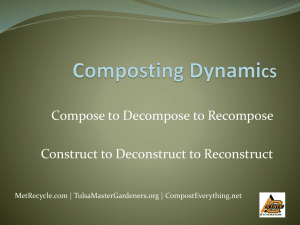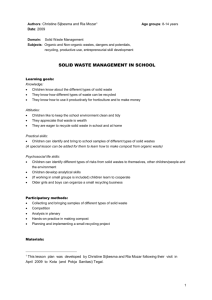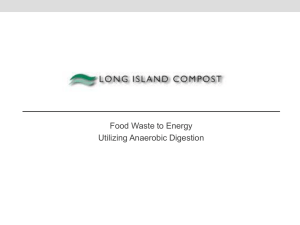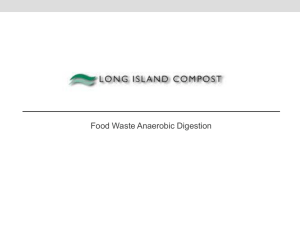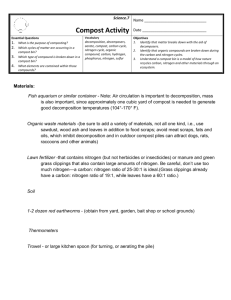Semester Exam Review
advertisement
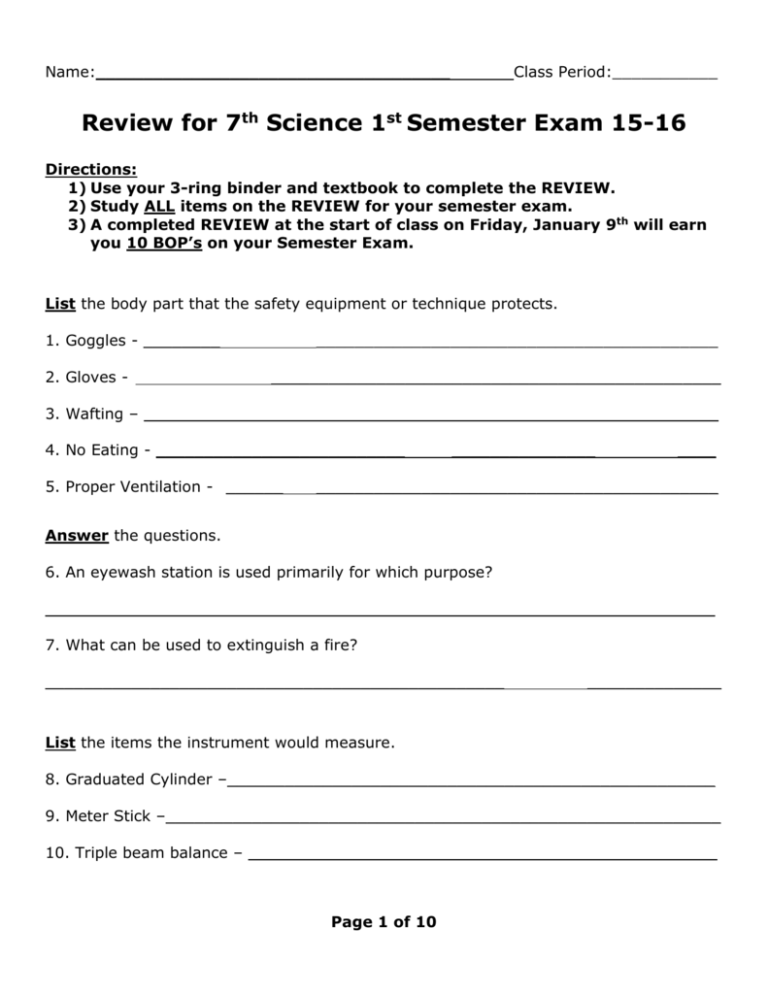
Name:_____________________________________ Class Period:___________ Review for 7th Science 1st Semester Exam 15-16 Directions: 1) Use your 3-ring binder and textbook to complete the REVIEW. 2) Study ALL items on the REVIEW for your semester exam. 3) A completed REVIEW at the start of class on Friday, January 9th will earn you 10 BOP’s on your Semester Exam. List the body part that the safety equipment or technique protects. 1. Goggles - ________ 2. Gloves - __________________________________________ _______________________________________________ 3. Wafting – ____________________________________________________________ 4. No Eating - __________________________ 5. Proper Ventilation - ______ _______________ ____ __________________________________________ Answer the questions. 6. An eyewash station is used primarily for which purpose? ______________________________________________________________________ 7. What can be used to extinguish a fire? ________________________________________________ ______________ List the items the instrument would measure. 8. Graduated Cylinder –___________________________________________________ 9. Meter Stick –__________________________________________________________ 10. Triple beam balance – _________________________________________________ Page 1 of 10 Answer the questions. 11. In an experiment, what is the variable that you can change? ______________________________________________________________________ 12. In an experiment, what is the variable being measured? _______________ ___________________________________________________ 13. In an experiment, what is the variable that stays the same through the entire experiment? ____________________________________________________________ 14. Scientists use their prior knowledge and experience to: ______________________________________________________________________ 15. What can be used to analyze data? ________________ ________________________________________________ 16. Define Observations: ______________________________________________________________________ Identify: Independent Variable, Dependent Variable, & Constant in an experiment. Label each piece of laboratory equipment. 17. 19. 21. _____ _____ ____ 18. ________________ 20. ________________________ Page 2 of 10 __________________________ ___________________________ Answer the questions. 22. What happens to the temperature in a compost bin during decomposition? ______________________________________________________________________ Interpret: Be able to interpret graphs. 23. What happens to the organic matter during decomposition? ______________________________________________________________________ 24. What energy transformation occurs as biomass decays in a compost bin? ______________________________________________________________________ 25. What materials in a compost bin will be recycled into soil-enriching nutrients? ______________________________________________________________________ ______________________________________________________________________ 26. During decomposition, what does the bacteria in the soil do? ______________________________________________________________________ 27. Where does a herbivore get it nutrients from in its habitat? ______________________________________________________________________ 28. In a compost bin, what process leads to the cycling of organic matter? ______________________________________________________________________ 29. What is a tropism? ______________________________________________________________________ 30. What is the definition of the prefix GEO? ______________________________________________________________________ 31. What is the definition of the prefix HYDRO? ______________________________________________________________________ 32. What is the definition of the prefix PHOTO? ______________________________________________________________________ Page 3 of 10 33. What is the definition of the prefix THIGMO? ______________________________________________________________________ 34. What gas do plants release as a result of photosynthesis? ______________________________________________________________________ 35. What energy transformation occurs during photosynthesis? ______________________________________________________________________ 36. Glucose helps maintain life on our planet by storing what type of energy? ______________________________________________________________________ 37. The diagram provided illustrates the process of photosynthesis, including the substances used by and produced by plants. What is the identity of the chemical represented by the question mark in the diagram? ______________________________________________________________________ 38. Show how energy flows through a food chain? ______________________________________________________________________ Identify: Producers, Consumers, Herbivores, & Carnivores in a Food Chain or Web. 39. Define Producer: ______________________________________________________________________ 40. Define Consumer: ______________________________________________________________________ Page 4 of 10 41. Define Herbivore: ______________________________________________________________________ 42. Define Carnivore: ______________________________________________________________________ 43. What element is found in all organic compounds? ______________________________________________________________________ 44. What is Denitrification? ______________________________________________________________________ 45. What is the difference between a primary, secondary, and tertiary consumer? ______________________________________________________________________ ______________________________________________________________________ ______________________________________________________________________ Identify: the paths that energy would flow through an ecosystem diagram. An example of an ecosystem diagram is below. Page 5 of 10 46. A diagram is provided. Which portion of the diagram represents the level with the most available energy? ______________________________________________________________________ 47. Why are bacteria so important to the nitrogen cycle? ______________________________________________________________________ Identify: Using a portion of the Periodic Table or an illustration of chemical compounds be able to identify if a compound is organic or inorganic. 48. What must a compound contain to be organic? ______________________________________________________________________ Page 6 of 10 49. The table provides information on the function of different digestive structures. Which of the digestive structures in the table can cause a chemical change to occur? ______________________________________________________________________ 50. What are Carbohydrates made of? ______________________________________________________________________ List the smaller molecule that each large molecule is broken down into by digestion. 51. Lipid to _____________________________________________________________ 52. Carbohydrate to ______________________________________________________ 53. Proteins to __________________________________________________________ 54. What is a chemical change? ______________________________________________________________________ 55. List examples of chemical changes during digestion? ______________________________________________________________________ ______________________________________________________________________ 56. What is a physical change? ______________________________________________________________________ 57. List examples of physical changes during digestion? ______________________________________________________________________ ______________________________________________________________________ Page 7 of 10 58. What are indicators a new substance has been formed? ______________________________________________________________________ 59. What is the formula used to calculate work? ______________________________________________________________________ Three situations in which force is applied to a box are illustrated. Describe what work is being done in each situation and how they relate to each other. 60. Situation 1: _________________________________________________________ 61. Situation 2: _________________________________________________________ 62. Situation 3: _________________________________________________________ 63. When an object is lifted directly from the ground rather than moved with an inclined plane, what will be increased? ______________________________________________________________________ 64. No work is said to be done in a situation where a force is applied to an object & ______________________________________________________________________ Page 8 of 10 List examples of these Simple Machines 65. Inclined Plane: ______________________________________________________ 66. Wedge: _____________________________________________________________ 67. Screw: ____________________ _________________________________ 68. Wheel and Axle: ______________________________________________________ 69. Lever: ___________________________________________________________ Answer the questions. 70. Define Newton’s 1st Law: ______________________________________________ ______________________________________________________________________ 71. Define Newton’s 2nd Law: ______________________________________________ ______________________________________________________________________ 72. Define Newton’s 3rd Law: ______________________________________________ ______________________________________________________________________ 73. Animals can move as a result of what energy conversion? ______________________________________________________________________ 74. What happens to the energy obtained by an organism when it consumes food? ______________________________________________________________________ 75. Mammals maintain their body temperature as a result of what energy conversion? ______________________________________________________________________ 76. Define Turgor Pressure: ______________________________________________________________________ 77. When a plant performs photosynthesis, the radiant energy of the Sun is stored as what type of energy? ______________________________________________________________________ Page 9 of 10 Describe the types of energy. 78. Radiant: _________________ __________________________________________ 79. Chemical: ___________________________________________________________ 80. Mechanical: _________________________________________________________ 81. Electrical: ___________________________________________________________ 82. Define Diffusion: ______________________________________________________________________ ______________________________________________________________________ ______________________________________________________________________ Interpret Diagrams of Osmosis. Be able to identify the direction in which water molecules will move. 83. Define Atom: ______________________________________________________________________ 84. Define Compound: ______________________________________________________________________ 85. Define Element: ______________________________________________________________________ Page 10 of 10
